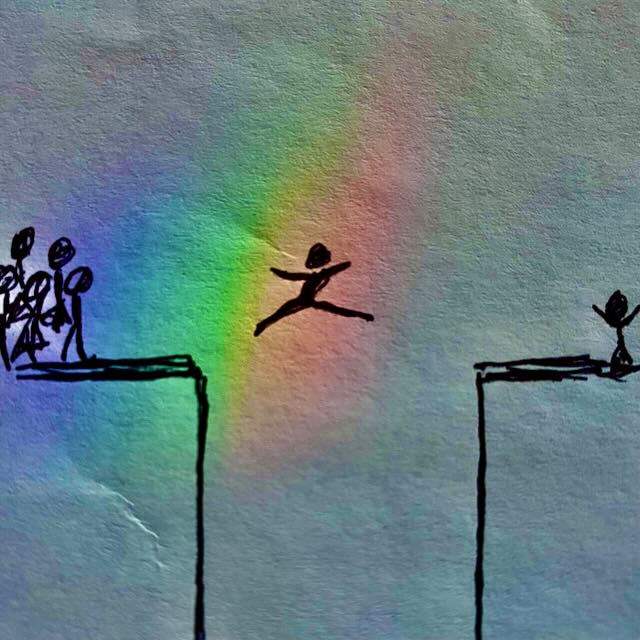I remember it as a moat, but it could have been a deep gap between two castle walls. I was 20 years old and was showing my dad around France, the country I’d called home for all of my not-yet-complete sophomore year in college. We were exploring Carcassonne, the Medieval hilltop citadel, and there was my dad—jacket off, backpack stashed—assuming the distance runner start position and rocking back and forth on the balls of his feet like a 54-year-old high school kid, ready to make a running leap and hurl himself across the gap.
One does not assume this moat-side stance without drawing attention to oneself. In fact, the rules of attraction seem to be amplified when there is a moat involved. A small crowd gathered around him. Because they were wearing brightly colored, neatly tucked scarves and square glasses, the crowd, in my memory, were tourists of the German variety. Tourists, just like us. They spoke impeccable English, of course, and didn’t even bother trying out a different language before cheering him on. That obvious, yes. There was also no doubt in their minds that their visit to Carcassonne was about to get a whole lot more interesting.
It would take a humble man to back down when the gathered crowd is fully invested. My dad, on that day, with the Germans standing by at full attention, did not back down.
What if I were to come to this memory during a past-life regression? Would it be so detailed? The answer is “maybe.”
How we experience our regression memories depends on many factors. First of all, it’s helpful to be aware of the way we experience things as they are happening. In therapy lingo, what kind of learner are you? Learning style is the way that you most efficiently and effectively take in, process, and retain information. First to consider are the big three: visual, auditory, or kinesthetic.
You’re visual if you prefer seeing things to understand them. You witness with your eyes. You like graphs and charts. When you recall, you see the scene or the experience. Visual cues are your trigger for thought and for memory.
You’re an auditory learner if you can easily process and retain what you hear. Audio books work for you, and you can remember details. You remember conversations with ease and you’re the kind of waiter that doesn’t need to write orders down to get them perfect every time.
If you need to touch things or move in interaction with them to learn their ins and outs, you’re kinesthetic. This is an active kind of learning. You might find that you feel what you’ve learned in your body. You might express your experiences with the words “I feel like….” or “it made me feel…”
On top of these, there’s one more big factor when considering the learning styles of the people I work with. Are you analytical? Adding “analytical” to the mix is like a booster shot to your predominant learning style. For an analytical thinker or learner, the details are important and they have to make sense. For example, one does not just see a sunset. One sees a pink- and orange-layered sky behind the black teeth of distance trees. And there are streaky clouds. And there is smoke on the horizon. Or one doesn’t just hear gulls. One hears gulls and talking and what did that man say? They are talking about the storm last night and the weather this morning. And there is a church bell and the sound of boxes being dragged along gangplanks. And the sails are flapping in the wind. You get the idea.
A visual learner will see past life images. An auditory learner’s experience will be made rich by the sounds of the experience. They might even say beautiful, evocative things like “it sounds like red.” A kinesthetic learner will feel things deeply and may not see much at all. Lots of people fit a mix of styles. And, of course, there are other senses that come into play. I have a client who is a chef. His senses of smell and taste are hyper-developed and are facets of his soul. When he experiences a life, he smells and tastes the details.
“The air smells warm, like cardamom and cinnamon and pepper.”
– Anonymous (2022)
Another factor in the clarity of past-life regression recall is emotional charge. This can both be a magnifier and a block, depending on the emotions. Let’s talk about the latter first. If someone experiences trauma in a past life (or the current one), it is highly likely that they cannot easily recall it at all unaided. Trauma often results in shut down. This is a dissociative closing-off, making the mental processing of an emotionally overwhelming experience impossible. You’ve heard of fight or flight. Sure, “flight” can mean running away, but it is more often actualized in mentally and spiritually taking oneself elsewhere. This was news again (it’s not new) just very recently in the August 22, 2023 article in The New York Times Magazine by Jen Percy, “What People Misunderstand About Rape.” I have seen this countless times when helping people reconnect with past- or current-life selves, and finding their consciousness completely separate from their body at the significant event we are accessing.
“I am above the house. My body is in there. I don’t want to be with my body. I am safer out here. I can see the clouds and I want to be with them. They look soft. They look safe. My body is in my room. I don’t want to know what is happening to it.”
— Anonymous (2023)
While no case is exactly the same, when we uncover trauma such as this, our approach is loving and comprehensive. We find or create a happy, safe retreat that we can return to at any time. We undergo body therapy to completely release the trauma from the body, freeing and empowering it and the soul. When there is no longer any emotional charge left in the body, we return to the event to process, understand, and let go. This is a remarkably powerful process, and it works every single time — every single time — to empower the person to move on peacefully into life’s next steps.
Alternatively, positive emotional charge can magnify details. It’s the same in the life we’re living here. Love makes us poets. Happiness turns up the colors and sharpens the edges.
As for what memories come up for us in a narrative, a lot depends on the intention we set at the onset of the session. It will always be related to an emotion or challenge that we pinpoint together given the healing that you are seeking. We then move from significant event to significant event. If something is significant to the healing we’re doing, it will come to you.
So perhaps in some future life when I am reviewing this one as Marit, I will have the pleasure of re-experiencing my dad’s great moat leap of 1992. (I’m visual and auditory and highly analytical, so I’d experience it accordingly.) It would be in replay of the things that brought me joy and laughter in a long lifetime full of lessons. And it would be among the greatest hits, for sure. I truly believe that reviews such as these are powerful. They remind us of the love that connects us. They remind us that life has its ups and downs and leaps of faith. They remind us not to take ourselves so darn seriously all the time. These things are so important and I want to remember.
He made it, by the way. He banged up his knee a bit and had to scramble to pull himself up on the far wall, but he did it. And the Germans cheered. Is that significant? Somehow, today, because I’m remembering it with a smile, I think it is.

